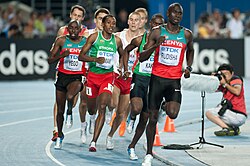| 800 metres at the World Athletics Championships | |
|---|---|
 The men's 2011 final | |
| Overview | |
| Gender | Men and women |
| Years held | Men: 1983 – 2025 Women: 1983 – 2025 |
| Championship record | |
| Men | 1:41.86 Emmanuel Wanyonyi (2025) |
| Women | 1:54.62 Lilian Odira (2025) |
| Reigning champion | |
| Men | |
| Women | |
The 800 metres at the World Championships in Athletics has been contested by both men and women since the inaugural edition in 1983. It is the second most prestigious title in the discipline after the 800 metres at the Olympics. The competition format typically has two qualifying rounds leading to a final between eight athletes.
Contents
- Age records
- Doping
- Medalists
- Men
- Women
- Championship record progression
- Men 2
- Women 2
- Finishing times
- Top ten fastest World Championship times
- References
- Bibliography
- External links
The championship records for the event are 1:42.34 for men, set by Donavan Brazier in 2019, and 1:54.68 for women, set by Jarmila Kratochvílová in 1983. Set at the inaugural championships, Kratochvílová's record is the longest-standing record of the competition. [1] The 800 m world record has never been broken at the competition by either men or women. [2]
Maria Mutola is the most successful athlete of the event: from a period spanning 1993 to 2003, she won three gold medals, one silver and one bronze in the World Championships 800 m. The most successful man is Wilson Kipketer, who won three straight titles from 1995 to 1999. Only two other people, Billy Konchellah and Ana Fidelia Quirot, have won two world championship titles in the event. Yuriy Borzakovskiy, though never a champion, has won the most medals in the men's competition, with two silver and two bronze medals.
Kenya is the most successful nation in the discipline, with five gold medals in the men's, two in the women's race, and a total of 13 medals overall. The actions of Mutola and Kipketer alone rank Mozambique at the top of the women's rankings and Denmark second in the men's medal table. Cuba—the second most successful nation among women—has won three women's gold medals. South Africa is the only nation besides Kenya to have provided both a men's and women's winner. Russia has the second highest overall medal tally, with eleven medals across the men's and women's divisions, but it has also provided six of the eight athletes sanctioned for doping at this World Championship distance.